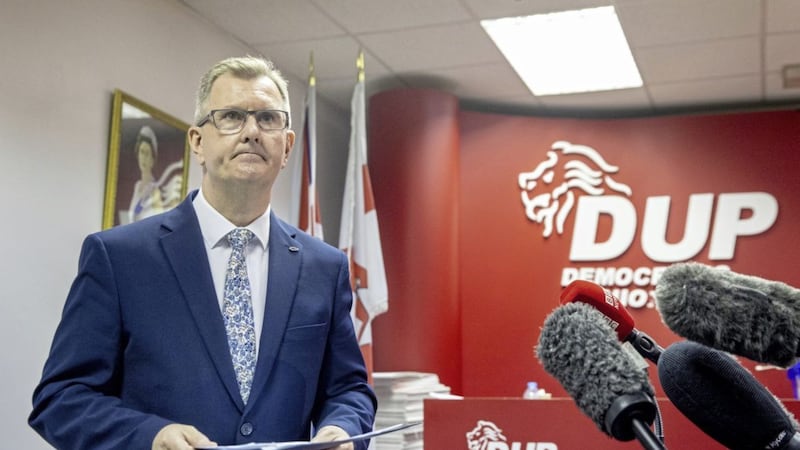Jeffrey Donaldson will be praying for a good weekend. That’s because the latest polling on his party’s support and his own popularity is due to be published.
He needs good news. Really good news. The sort of news that rattles his opponents (particularly the UUP and TUV) and makes most of his MLAs believe they have a fair chance of holding their seats at the next assembly election—just about eight months away.
At the 2017 assembly election the DUP polled 28.1 per cent to Sinn Fein’s 27.9 per cent. It was an uncomfortably thin margin of victory of one seat and about 1200 votes. Thanks to Jim Wells having had the party whip removed a few years ago and Alex Easton's recent resignation Sinn Féin now has a one seat lead over the DUP. The last three opinion polls from LucidTalk have given the party a lot more to worry about: October 2020 (23 per cent), January 2021 (19 per cent) and May 2021 (16 per cent).
Those are the sort of figures which spook a party. Spooked it so much, in fact, the party is now on its third leader this year: and could even have a fourth if the latest poll doesn’t give Donaldson the sort of boost he needs to be able to say—and with a perfectly straight face—something along the lines, “the DUP is back in business and ready to restore the confidence and interests of the unionist people.”
He will have something else on his mind when he reads the figures. A DUP clearly on the up means the chances of holding on to Lagan Valley in a parliamentary by-election (which will be required if he wins an assembly seat) will increase. And that could be a useful bargaining tool if he’s hoping to persuade either Edwin Poots or Paul Givan to stand down early, allow him into the assembly as first minister and, in turn, allow one of them to contest and win the Westminster seat.
But if both Poots and Givan want to fight for their assembly seats instead it means running a third candidate in a constituency where the DUP only has two and will need luck to win a third (so an indication from the weekend polls that the UUP, TUV and Alliance are slipping a little will also cheer up Donaldson). Six seats would have made the task very much easier, but the reduction to five (agreed between the DUP and Sinn Féin a few years ago) was a tactical error which came back and bit the DUP (all of unionism, actually) in the 2017 ‘crocodile’ election.
Three candidates in Lagan Valley would require a spectacularly good election campaign by the DUP. That could be difficult. Donaldson is a leader who needs to win an assembly seat if he wants to be first minister. Poots is a former leader who was overthrown by Donaldson in a wonderfully brutal coup just a few weeks ago. Givan never expected to be first minister but will cling on for as long as he can—maybe hoping that Donaldson fails to get elected, stands down after another internal coup and leaves the door open for Givan to be leader and maybe—depending on overall results—first minister, too.
That’s the sort of background in which joint campaigning and intelligent sharing of the overall DUP vote is shredded in favour of what I’ve previously described as the Game of Thrans scenario—where no quarter is given as the candidates stagger through the piles of excrement their supporters toss by the bucket-load at each other.
In fairness to Donaldson he has managed to steady the DUP ship since he became leader. I wouldn’t go as far as suggesting it’s ready to be described as the Love Cruise but, for the time being, the crew has decided not to make him walk the plank. But they, too, need to see good news in the latest polls. Good news gives them the strength to face up to pressure from the elements of loyalism who’d quite like the assembly to collapse altogether. Bad news, on the other hand, makes them vulnerable to both loyalism and other unionist parties who’ll be whispering in their ears about the need to toughen up or face defeat in a few months.
The assembly election in 2003, followed by the defection of Donaldson and Foster, was a key turning point for the DUP: the moment when it replaced the UUP as the lead party of unionism. The 2022 election could be just as important. This time, though, it isn’t just about being the largest unionist party: it also has to see off serious challenges from Sinn Féin and Alliance, as well as keeping control of the first minister’s office. My hunch—which is all it is—is that the DUP will probably do better than expected next April or May








